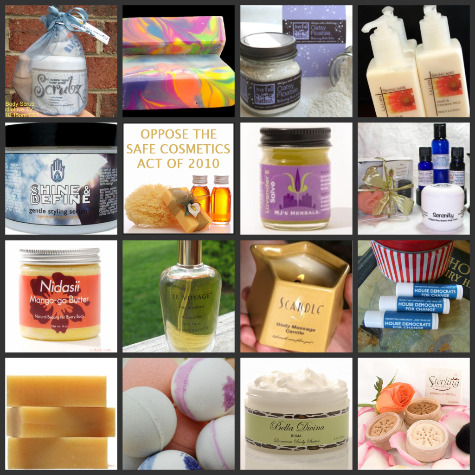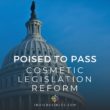As the founder and CEO of the Indie Beauty Network, I am confirming that IBN opposes the bill named, “H.R. 5786: The Safe Cosmetics Act of 2010 (SCA or H.R. 5786). If you have not already done so, please read and sign our petition opposing the bill. As of the publication of this post, over 2,100 people have signed the Petition. Please also follow the action on Twitter at @OpposeSCA and the #OpposeSCA hashtag.

(Read about the IBN member products on display here at the end of this post.)
I have published dozens of posts about FDA Globalization Act of 2008 and FDA Globalization Act of 2009 in the Advocacy Category at this blog. If you make and sell cosmetics and you are not yet up to speed on the history of this bill, please read those posts from oldest to newest so you are armed with the information you need to lead your business during this time. I know you're busy, so if you only have time for a few posts, please start with this one and this one. Here are the reasons why IBN opposes SCA. If you have already read and signed the Petition, then you can skip this. I'm duplicating it here so this blog contains the full context of our opposition as it stands today.
SCA was written with robust consultation with a private coalition of people, including the Campaign For Safe Cosmetics and the Environmental Working Group, claiming to represent the interests of consumers. The sponsors of this petition are the men and women who manufacture cosmetics on a small scale in the country, and their customers and other people who support America's small business owners.
Safe Cosmetics
While I personally and all of IBN's membership are unquestionably in favor of safe cosmetics, H.R. 5786 contains unnecessary provisions that would decimate our nation's small scale cosmetics manufacturers without any benefit at all to consumers.
H.R. 5786 treats a company making 100 bottles of lotion each year the same way it treats a multi-billion dollar, multi-national company making 100 bottles of lotion each second. It is grossly unfair, unduly burdensome, intrusive and unnecessary in a number of aways, among them the following:
H.R. 5786 is unnecessary. Small cosmetics companies have a history of producing safe cosmetics pursuant to current laws that require companies to clearly identify the products they sell, provide all manufacturer contact information and truthfully label products with ingredients.
H.R. 5786 contains onerous registration requirements. HR 5786 contains intrusive and unnecessary requirements that would force small companies to disclose to the federal government information that the government does not need, which is unduly burdensome for small companies to provide and which does nothing to protect consumers from unsafe cosmetics.
Specifically, in addition to having to register their company name and location, small companies would also have to file with the federal government product descriptions, product ingredients, trace ingredient in products, gross sales numbers, the name and contact information of the suppliers of the ingredients used in their cosmetics and their number of employees.
H.R. 5786 contains unnecessary labeling requirements. Current cosmetics laws already require small companies to list ingredients on labels. HR 5786 expands labeling requirements to include trace elements found inside those ingredients. For example, a product containing water (or any other natural ingredient), would have to contain a label listing the water and also every other trace element inside that water. (Water contains a number of chemicals, including nickel, lead, copper, silver and dozens more — depending on the water source.) Requiring small companies to include such a list on each label is onerous and unnecessary.
H.R. 5786 requires small companies to conduct unnecessary scientific testing. Under the bill as drafted, small companies would be required to test all of the products they make, and be in a position to produce data to the federal government about the ingredients, components of ingredients, and also, components that may be produced when known ingredients are combined. Those are impossible (and unnecessary) standards.
H.R. 5786 is anti-American. At a time when our Congressional representatives should be seeking to revitalize the American economy, especially where manufacturing is concerned, HR 5786 would eliminate it in cites and towns in every state across this nation.
H.R. 5786 specifically allows all 50 states to pass stricter requirements. Even with the sweeping nature of HR 5786, it specifically states that each state can pass additional laws as it sees fit. This provision is Congressional permission for each state to pass whatever laws it wants, creating a patchwork quilt of laws that no small company can comply with.
If Texas (or Oregon or Rhode Island or your state) adds labeling or manufacturing requirements that are different from HR 5786, and also different from other states, then no company will be able to sell so much as a quarter-ounce tube of lip balm without first checking to make sure they are not in violation of 51 separate cosmetics laws. No small company can do that (and most large ones can't either).
H.R. 5786 does not contain an exemption for small business owners. Many laws in this country exempt small companies because compliance would put them out of business without any real benefit to society. The same is true in this case. H.R. 5786 treats the smallest company making 50 products a day the same way it treats our nation's multi-million dollar companies. While there is an exemption from the annual payment of fees, the testing and paperwork requirements in this bill place burdens on very small businesses that are unfair, overreaching, unnecessary, offensive and intrusive.
America's Small Businesses
Our nation's small cosmetics companies are in large part launched by men and women who want to create alternatives to products that can be purchased at “Big Box” stores. They use a high proportion of naturally occurring ingredients when compared to larger companies, and they are not producing cosmetics on a large scale at all. And that's why their customers love their products, and that's why Congress must make sure that it passes no law that puts them out of business without any benefit to consumers. This is one such law.
Summary
Small companies are the backbone of our nation's economy. In fact, today, they are sustaining it almost single-handedly. As unemployment figures continue to rise, small companies are hiring employees, contractors, vendors and other small scale service providers to help their businesses grow.
Consumer Choice
At farmer's markets, locally owned spas and boutiques and in the retail stores that small cosmetics manufacturers are opening everywhere, consumers are able to choose to buy a wide and appealing variety of cosmetics to suit their personal needs. They can choose from products made by big companies and they can choose from products made by smaller companies. That choice will be removed if HR 5786 becomes law. if that happens, consumers will be left with a small selection of products sold only by our nation's largest retail chains.
America is filled with talented innovators and entrepreneurs who don't need a big bank loan or a huge line of credit to manage a profitable business.
Small cosmetics companies can continue to do their share to carry this nation, but not if HR 5786 passes.
It is the duty of our Congressional representatives to pass laws that are carefully tailored to deal with specific problems that need to be addressed on a national scale. HR 5786 is not carefully tailored to help anyone.
If H.R. 5786 as drafted becomes law, it will close multiple thousands of small companies immediately and in one fell swoop.
What You Can Do
Here are 3 things you can do right now to oppose this oppressive, and unnecessary law.
Subscribe to Oppose SCA. Stay informed.
Sign the Petition. Oppose this bill.
Write a letter to your Congressional Representatives telling them why you oppose this bill. You can find out who your Representatives are at this link. Once you identify them, you can easily open up an email window to send them your letter via email. (If you need a template, please use the one here, provided for re-publication here with permission from Anne-Marie Faiola of Brambleberry. Visit her blog.)
Send updates to your customers. Let them know that, if this law passes in its current form, the wonderful, safe products you make made with a high proportion of natural ingredients may no longer be available to them. I am working on loading some template letters to the Oppose SCA site, so stay tuned.
Question: Have you signed the Petition? Written your Representatives? Informed your customers, neighbors, family members and friends? Now is the time!
Here are the products in the collage, from left to right, top to bottom: Scrubz Body Scrub (New York), Sinfully Sweet Soaps (Georgia), Joyful Bath Co. (Virginia), Lillian Skincare (Tennessee), Oyin Handmade (Maryland), Logo, MJs Herbals (New York), Nidasii (New York), Joanne Bassett Perfume (California), Least Likely To Breed (Pennsylvania), Manor Hall Soap (Massachusetts), Marmalade Hills (Michigan), La Dolce Diva (Georgia), Sterling Minerals (Idaho). There are hundreds more!! I wish I could tell you about them all, and I will, at the Oppose SCA blog!
Who knows whether any of these business, already making safe products, could withstand H.R. 5786? Of course I have no crystal ball, but I have to say that I doubt it.
(Note: I included soaps in this collage because they are lovely. It is not altogether clear whether H.R. 5786 defines soap as a cosmetic. Current law does not.)



